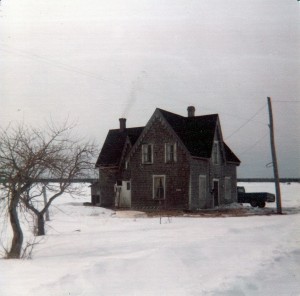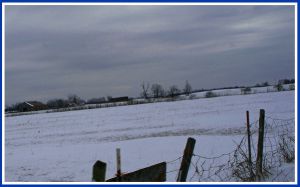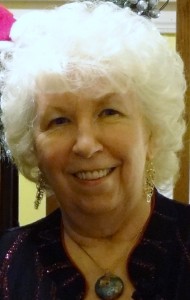The house was on the shore, about 100 feet from the water, right where the Black River flows into the Miramichi. It was a pretty house, weathered grey with sharply pointed gables and gingerbread trim. It looked a little worse for the wear. From a certain angle, it looked as if it were leaning back on its haunches; it had been built many years ago, with no foundation, and was “settling”, especially toward the back, where the kitchen was. From the front, it looked as if it were hunching its shoulders against the northeast winds that swept around the point, blowing in from the Miramichi Bay. It was a cold old house.
___________________________________________________________________________________________________________________________________________
February 17, 1976
I forgot to push the rolled-up blanket against the door before I went to bed so there was snow on the kitchen floor this morning. The wind battered the house all night. It’s some cold. The glass of water I took to bed with me was frozen when I got up — frozen solid, not just a little skim of ice like sometimes.
The water in the kettle on the stove was frozen too. I got the fire going and waited for the water to melt so I could prime the pump — at least I remembered to drain the pump last night.
After I got the pump working, I filled the big copper boiler on top of the stove to get some hot water. It was wash day and I wanted to get an early start to get the clothes hung outside while there was still some daylight. I had a few dishes to do so I started on them first. The dishwashing detergent wasn’t frozen but it had turned into a gel so stiff, it was almost solid. I had to use a knife to get some out of the bottle. I suppose I’ll have to start keeping it in the fridge.
The fridge is huge. I saw it advertised in the newspaper and a deal was pretty much made over the phone. I’ve never had a very good grasp of the size of an object that’s described in cubic feet. Anyway, I’m glad now. I keep many things in the fridge. It keeps them from freezing: things like canned goods and ketchup; oils and vinegars; potatoes, pickles and peanut butter — not to mention shampoo and conditioners, moisturizers, makeup and lotions. I think I could — as it used to be expressed — sell refrigerators to Eskimos. They could use them the same way I do.
I almost froze my fingers getting my big washtubs in from the shed. My hands were a little damp and when I reached up to lift the first tub off the hook where it hangs, my fingers stuck to the surface. I peeled them off; no permanent damage but I went and put my gloves on before I dragged the tubs in.
The two tubs sit side by side in the middle of the kitchen floor, one filled with hot soapy water, the other with less hot clear water for rinsing. The steam rises into the still-cold air of the kitchen like you see from those hot springs in Iceland. I sit on a cushion. I have a washboard for scrubbing and a hand-operated wringer that clamps on the side of the tub for wringing. A little shelf at the bottom of the wringer moves back and forth to keep the soapy water draining into the soapy tub and the clear water back into the clear tub. It’s very efficient.
I put the newly wrung-out clothes and towels and sheets into a wicker basket on the floor beside me but before I got outside to the clothesline, the bottom layer had already started to freeze up. I put a few layers of newspaper and a folded blanket under the basket until I was ready to go out.
God, it was cold out there. I was already wearing long underwear, heavy pants, wool socks and a couple of sweaters and I added boots, scarves, jacket, mitts and a wool hat plus earmuffs. The wind was still blowing and if the clothes weren’t frozen in the basket, they were most certainly frozen by the time I got the clothespin fastened onto the line. It’s not that easy to do, wearing gloves and mitts and still having numb fingers. Why do I do it? Well, they’d freeze if I hung them in the house anyway and they dry a little faster outside, especially in that wind.
After the clothes were hung and as long as I was dressed for outdoors, I decided to fill the woodbox and take a trip to the outdoor facility to empty my little private indoor commode. It was frozen too.
I made some bread this afternoon. I had lots of potato cooking water, bottles and bottles of it — in the fridge, of course — and a bag of stone-ground whole wheat flour my sister had given me for Christmas. It has taken me quite a while to find the best way to raise my dough in that cold old kitchen. I tried placing the bowl in the warming oven of the wood stove but it was too warm. It rose too fast and the texture wasn’t good. Placing it on the outer edge of the open oven door caused an uneven rise.
I finally worked out a system that involves hot towels, newspapers for insulation, and an enclosed space that holds some heat where I set my big bowl — a medium-sized cardboard box works fine. (I’m quite inventive. I’m the same person who used to bake beautiful loaves of bread in a fireplace that I built on the shore out of flat stones and mud with a refrigerator shelf from the dump as the baking rack.)
The rest of the day was uneventful. I brought the clothes in and stood them up around the kitchen until they thawed and fell over. They really do smell good. I read a lot, with my chair pulled close to the stove and my feet on the open oven door. I’ve drained the pump and I’m ready for bed now. My head got really cold in bed last night. I’ve put a large thick towel at the bedside so I can wrap it around my head tonight, if necessary.
___________________________________________________________________________________________________________________________________________
The stories I tell about living in the cold old house on the shore are not about poverty or hardship. They’re credentials. I tell them because it’s fun to tell them. I tell them so I don’t feel I have to explain why I love my washing machine.
But I tell them carefully and never with a suggestion of deprivation. Every day I lived in the old house, I thought of the woman who had lived there first, whose husband had built the house in the early part of the century. She had eleven children, most of them born in those very rooms. She had no electricity, no car to take her to town for shopping, no fridge to keep her food from freezing. And her water pump, unlike mine which was conveniently located in the kitchen, was outdoors.
There was another woman I used to think of too, while I was living in that cold old house. She lived in Chatham, where I grew up, and I met her only once.
It was 1950. I was six years old, a sweet little girl with long hair curled into ringlets by my mother every morning, dressed carefully in tiny pleated skirts and crisp white blouses, sent to school with bookbag and accessories — a pencil case, a plastic ruler with a hole in the middle, a soft pink eraser, fresh notebooks, everything I needed. I went to The White School, an old wooden building that must have had another name in the beginning but was never known by another name in my time. It seemed very big to me; today, when I drive by the lot where it used to stand, I realize that it didn’t take up much space. The students who went there were mostly working class; a few were middle class; some were very poor.
One day in winter, all of us in grade one, having struggled into our winter duds, were standing in line in the ante-room waiting for the teacher to come around and tie our scarves at the back of our necks so they’d be ready to pull up over mouth and nose for the cold walk home. As she approached me, I saw with dread that she was carrying a small sheaf of papers.
“I want you to take Eddie’s lessons home to him,” she said. “He was sick today.”
My little heart sank. I was scared of Eddie anyway and I had heard all the lurid White School tales about the house where he lived. I didn’t understand some of it but I knew what a bootlegger was. This was a grade one nightmare.
I lagged behind the others on the way home. I tried to think of some way of getting out of it. Finally — but much too soon — I turned down the street where Eddie and his family lived, in a ramshackle frame house behind an abandoned building. I picked my way through the rubble in the snowy yard — old car parts, an overturned wheelbarrow, a wagon with no wheels. Before I knocked, the door opened. A woman holding a baby was standing there.
“Who are you? Who sent you ‘ere?” she said.
“I brought Eddie’s lessons from school.”
“Come into the ‘ouse.”
Oh no oh no. This was not part of the deal. The room she led me into was more like a shed: it had bare board floors, a few old sticks of furniture, an unmade bed in the corner. It was cold. There was no sign of Eddie or any of the older children or the bootlegger but there were small children, a few of them — toddlers and babies.
“What’s your name?” she said. I told her.
“I know where you live. A new ‘ouse.”
It was a new house; it was owned by the power commission where my father worked. It was an ugly house and my mother didn’t like it. But it had a furnace and rugs and matching furniture and curtains. To Eddie’s mother, it must have seemed like living in a palace.
My childhood experience had not prepared me for her house. How could I have fit that cold hovel, those ragged children, that unkempt woman into my ordered little life where we collected money in Mission Band to buy food for hungry little heathen children in India; where we made little drawstring bags out of facecloths and filled them with soap and toothpaste and toothbrushes and combs and maybe a barrette for deprived children in Africa?
How could it be that there were little children in Chatham living like this? Did they have enough to eat? Did they ever have roast beef on Sunday? Did they have any toys or storybooks? Did anyone ever take them to the beach? Did they have aunties and uncles who visited at Christmas? Was there even a stove in this place?
These specific questions came to me years later; at the time, I asked no questions at all. I don’t know why except little children often feel shame and embarrassment when faced with complex situations that are uncomfortable.
I never saw Eddie’s mother again. I think they moved away shortly after my visit. I never told anyone I’d been there.
There was something else I never told anyone. The day I went to Eddie’s was the third time the teacher had asked me to take his lessons to his house. The first time, I tore the pages into little pieces and buried them under a rock in a swampy ditch on the way home. The second time, I put them at the bottom of the box where I kept my supplies for playing school. No one ever found them.





Sharon, I LOVED the two stories! They were totally absorbing and I was right there beside you the whole time.
I have a fascination with old houses, too, and the stories they could tell. When we lived in NFLD we spent a lot of time hiking to deserted and re-settled outports, and saw several lonely old houses. Some still had curtains at the windows.
Thank you!
Cicily
What a story teller you are Sharon. Your vivid description brings back memories of my youth growing up in Summerside PEI.
Keep them coming.
Sharon, wonderful — brought back memories of seaside old houses which are being abandoned or renovated here in New Zealand. The wind from Antarctica can blow cold in winter as it rips across the dark gray sea and cloudy skies. One of my favorite books and movies is The Shipping News … the old house being dragged across the frozen Newfoundland landscape is forever etched in my mind.
Hi Sharon, love your stories, especially the part about learning how to rise bread in a cold kitchen — I relate. I also relate to your story about delivering the homework. There were homes (should I rather say houses, as they didn’t seem very homey) where I grew up that I was loath to enter. The smells, the chills, the poverty all terrified me.
Best, Susan
Sharon, this reminds me of the drafty old house I lived in on the Eastern Shore, where the curtains moved in the living room even if the windows were closed, and the furnace started with a thump that shook the whole place. My electric blanket was my best friend. On the other hand, there was a furnace, and except for the time when the power went off and you could see your breath inside, it was never cold enough to freeze a glass of water!
Sharon, I loved your stories — the last one was my favourite. They should both be published! Thank you.
Thanks, Sharon. Loved both pieces. I always said I wasn’t the only great writer in that old Black River house. The winter essay brought back cold memories!
love love love these stories brought back so many memories
Sharon, truly enjoyed reading your stories. I grew up in Chatham along the Miramichi very close to the train station. We were far from rich and I remember the hard times and the tubs of water for washing and the hand wringer. We even had our baths in a big tub my mom would heat the water and fill the big tub and put chairs around the tubs with blankets over the chairs so we could bath in some sort of privacy. As hard as those days were I miss the older, simpler times and your stories are so great in bringing back these memories. Thank you for writing them.
Been there…done that! Love your writing Sharon. Certainly stirred up memories of the ‘good old days’.
Thanks so much for sharing your stories—especially “Two Miramichi Winters”. Your graphic images took me back to my childhood days in Napan Bay, where we didn’t have electricity or “chip seal” until the early ’50′s!! Depite the lack of modern coveniences, we had a wonderful rich , uncluttered life.
Sharon, your flair for creative writing was very evident in those English I classes of yore—-now frowned upon as being too austere. You indeed have a special talent, so cherish and nourish that gift.
So glad to see you at the Reunion this summer. Take good care!
Thoroughly enjoyable Sharon … as usual … Funny how we can all relate so easily to events , situations and people growing up in a small town .
Awsome story teller, can envision every line!
Dear Sharon,
I love the story and belive I know the house .
I am the Daughter of the family that grew up there ,if not mistaken I think that may be my grandfathers house .
I would love to speak with you via FB or by Email.
This story is similar to ones my mom told me .
Thank you ,
Wendy